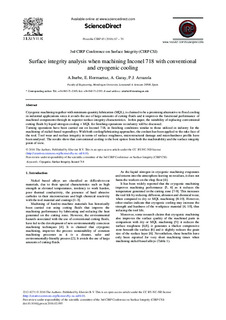
Izenburua
Surface Integrity Analysis when Machining Inconel 718 with Conventional and Cryogenic CoolingEgilea (beste erakunde batekoa)
Bertsioa
Bertsio argitaratua
Eskubideak
© 2016 The AuthorsSarbidea
Sarbide irekiaArgitaratzailearen bertsioa
http://dx.doi.org/10.1016/j.procir.2016.02.095Non argitaratua
Procedia CIRP Vol. 45. Pp. 67–70, 2016Lehenengo orria
67Azken orria
70Argitaratzailea
ElsevierGako-hitzak
CryogenicSurface Integrity
Inconel 718
Laburpena
Cryogenic machining together with minimum quantity lubrication (MQL), is claimed to be a promising alternative to flood cooling in industrial applications since it avoids the use of large amounts of c ... [+]
Cryogenic machining together with minimum quantity lubrication (MQL), is claimed to be a promising alternative to flood cooling in industrial applications since it avoids the use of large amounts of cutting fluids and it improves the functional performance of machined components through its superior surface integrity characteristics. In this paper, the suitability of replacing conventional cutting fluids by liquid nitrogen cooling + MQL for finishing operations in industry will be discussed.
Turning operations have been carried out on Inconel 718, in finishing conditions similar to those utilized in industry for the machining of nickel-based superalloys. With both cooling/lubricating approaches, the coolant has been applied to the rake face of the tool. Tool wear and surface integrity in terms of surface roughness, microstructural damage and microhardness profile have been analysed. The results show that conventional cooling is the best option from both the machinability and the surface integrity point of view. [-]
Sponsorship
Gobierno Vasco-Eusko JaurlaritzaProjectu ID
info:eu-repo/grantAgreement/GV/Convocatoria de Universidad Empresa 2013-2014/UE2013-08/CAPV/Determinación de condiciones de corte optimas en el mecanizado criogénico de discos de turbina de Inconel 718 Plus/CRINCOPLUSBildumak
Item honek honako baimen-fitxategi hauek dauzka asoziatuta:






















